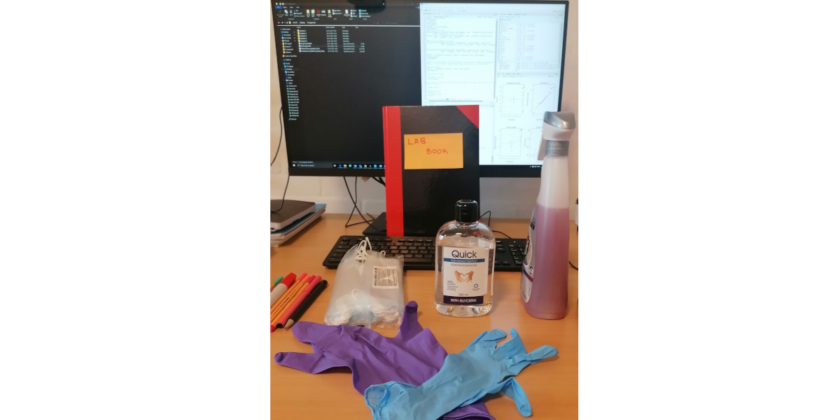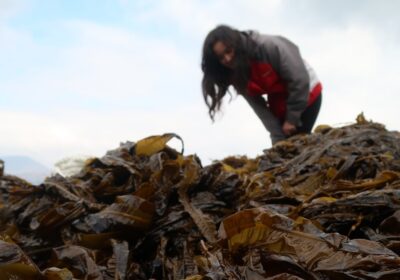Exactly one year ago, the 17th of January 2020, I was informed that I was admitted as a PhD student, at the Danish Technical University of Copenhagen (DTU), as member of the AgRefine ITN Program. My first reaction was…I cannot believe it. I am in. I got the position. I am a PhD candidate and I am looking forward to start this unique experience. As I was intrigued both by my project and by the general idea of the AgRefine program, I started my research directly and my studies were due to begin at the beginning of April 2020.
At the same time, there were rumors of a new virus, which was spreading through China. The news was deteriorating day by day and finally Covid-19 reached Europe. One month later, a total lock-down was announced. My recruitment process was paused, until further notice and I thought; now what?
By June I was able to finally start working on my PhD project. In the beginning, I was very excited; excited to be back in the laboratory, excited to meet my colleagues in person and work closely with the other PhD candidates of the AgRefine program, excited to start participating in conferences, attend seminars and courses. However, little by little my excitement began to diminish, and my expectations started to fall as I had acknowledged the difficulties of starting a PhD in the time of Corona.
One year later, after the Covid-19 outbreak, I am still trying to accept the difficulties of the era we are living in. I am still trying to find motivation, ignoring for some hours per day what is happening around me. My biggest support comes from the communication with friends and colleagues facing the same reality as I do. With them I share my fears, worries, difficulties, but also gather good tips and advice on how to continue being positive and remain curious.
So here follows a small, informal study, including information and advice by friends and colleagues conducting their PhD studies, in different countries, different field of studies and different years of their studies. In total, 20 people participated. Each of them had to write 2 to 3 factors on things they feel intimidated by and 3 pieces of advice on how they are trying to deal with them.
Our biggest concerns
According to this small study, three were the most common concerns;
- How to manage the drop in productivity and motivation, which is often leading to anxiety (affects 40% of the people).
- How to deal with social isolation (affects 35% of the people).
These two points were especially prevalent among new PhD students, who had just relocated to new countries, or were in new working environments, where it was hard to make connections and friendships.
- Especially for PhD students, after the second year of their studies, the project delay is their biggest fear (affects 35% of the people).
Three answers follow these top three concerns:
- The lack of networking is concerning (affects 30% of the people). Since home-office is the norm and all the scientific events take place online, meeting present or future collaborators seems almost impossible.
- A lot of people find virtual reality tricky, lonely, and difficult to keep up with (affects 25% of the people).
- A common concern was the inability to conduct field work, cooperate with other departments, or participate in secondments at other institutions (affects 25% of the people).
Other reflections included the shortage of communication with the supervisor and the research group. Of course, the difficulties and the distractions connected with the home office experience were also much discussed. Other worries recorded in this study; noted issues with grant extension, the fear of getting sick with Covid-19, development of body pains due to poor posture from working at home. Finally, participants raised the difficulty of ordering materials for their experimental process, bureaucratic delays, and difficulty working wearing a mask.
However, we need to find solutions and ways to continue life as normal as possible. By collecting all the pieces of advice, ideas and coping strategies suggested by my study group, I have created the “Anti-Virus Diary”.
The anti-Covid Diary
- You are not alone. Take a break, step back and acknowledge what is happening. It is of high importance to realize and accept that this is a pandemic, which affects everyone, worldwide.
- Be a team player. Try to have a constant communication with your supervisors and colleagues. Organize weekly meetings to refer on your progress and set new goals.
- Meanwhile, keep socializing with your colleagues, by arranging virtual coffee- or evening board game meetings.
- Stay connected. Communicate with your family and friends. Share your feelings, your worries and try to support each other. Find peers with same interests and exchange ideas and share advice.
Still, it is important not to be afraid to be alone. Find time to work with yourself.
- Spatial and temporal organization. For better progress and moral boost, it is very important to stick to a program. It is important to keep track of time, have constant breaks and separate the weekdays from the weekends. If it is helpful, make lists and set targets. There are a number of mobile apps (ex. Trello, Slack, Offtime) that can contribute to this task. Meanwhile, keep your working space clean and organized, make your working environment hyggeligt (cozy), as they say in Denmark.
- Remain curious. Try to remember your primary targets, before starting the PhD. Why did you choose this position? Recall your dreams. And then keep up with online conferences and seminars. Read some new papers or books connected to you studies.
- “Healthy mind in a healthy body”. Do not forget to move. Go for a run, connect again with nature, dance in your room listening at groovy sounds, do some yoga. Sitting in front of a screen, the whole day can cause body pains, deteriorate your vision and cause brain fog.
- Time for new hobbies. Lockdown is the perfect period to explore something new or keep up with the old. Read your favorite book, listen at some music while cleaning the house, cook your favorite food, play a musical instrument or make a puzzle.
In writing this blog, I hope that we can benefit from shearing our fears and pieces of advice and reach others out there, whether you are a PhD student or not, but are sharing the same difficulties. I hope these tips give you some courage and remind you that you are not alone. And most of all give some motivation and sparkle to not give up.
I would like to thank the AgRefine PhD students, my colleagues from Danish Technical University of Copenhagen and my friends for participating and giving their insight for this blog.




